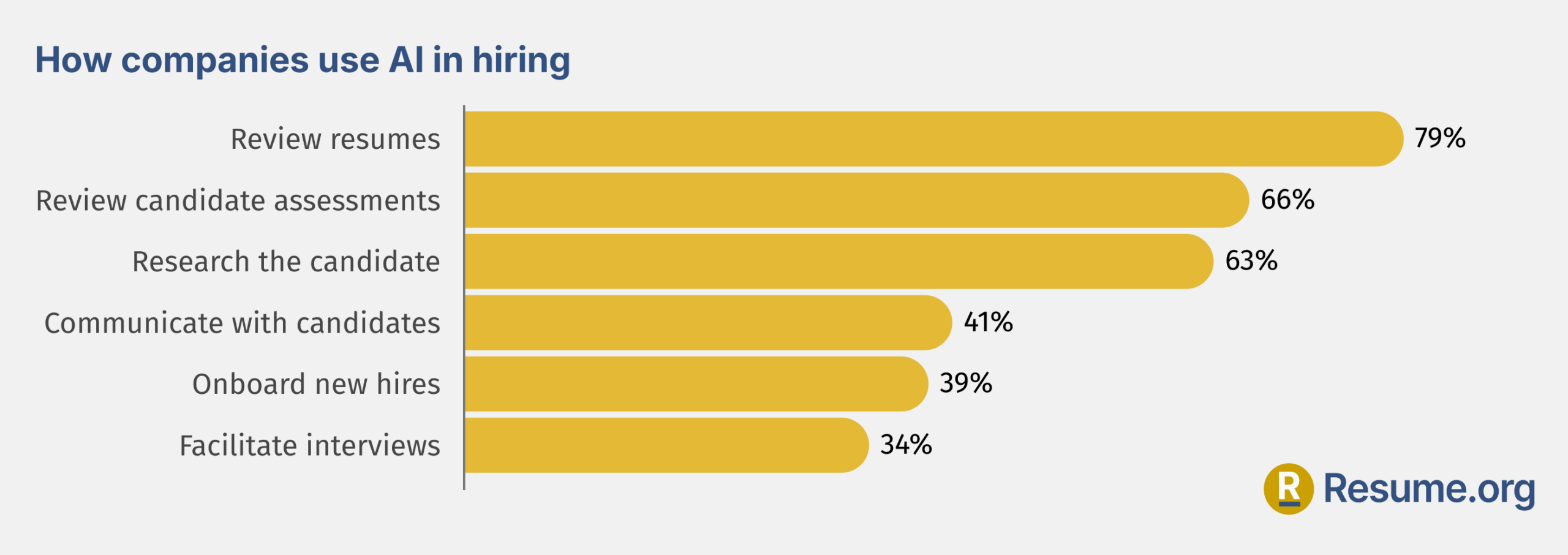In August, Resume.org surveyed 1,399 full-time U.S. workers with extensive knowledge about hiring practices at their company to understand how artificial intelligence (AI) is transforming the hiring process.
Takeaways:
- 57% of companies already use AI in hiring, and 74% say it has improved the quality of their hires
- 34% of companies that use AI in hiring use it for interviews
- 1 in 3 companies believe it is likely AI will run their entire hiring process by 2026
- 57% of companies using AI worry that it screens out qualified candidates, and 50% fear it introduces bias
- 3 in 4 companies allow AI to reject candidates without human oversight
6 in 10 Companies Are Using AI To Hire
AI is quickly becoming a standard part of the hiring process. Today, 57% of companies use AI to support hiring, and the results are promising. Nearly three-quarters (74%) report that using AI has improved the quality of their hires.
Of companies that use AI in the hiring process, AI is most commonly used for resume reviews (79%), candidate assessments (66%), and researching applicants (63%). Smaller but significant shares also apply AI to candidate communication (41%), onboarding (39%), and even interviews (34%).

Half of companies using AI for interviews allow it to conduct them
Among companies that rely on AI for interviews, the most frequent tasks include analyzing candidate language (66%), transcribing interviews (65%), and assessing tone, language, or body language (59%). Some are pushing further into advanced territory, with 58% collecting facial recognition data and half allowing AI to conduct interviews directly.
When AI conducts interviews, 71% of companies always retain human oversight, 23% say it depends, and 6% say AI runs the process independently.
Feedback received from candidates has been overwhelmingly positive, with only 4% of companies saying they’ve received negative reactions from candidates about AI’s use in the interview process.
“Companies should be open with candidates about AI’s role in hiring to build trust, improve the candidate experience, and meet evolving compliance standards,” says Resume.org’s Head of Career Advising Kara Dennison. “This means clearly explaining where and how AI is used, whether it makes recommendations or rejections, the level of human oversight, and what data is collected. This proactive approach promotes fairness, prepares candidates, and demonstrates a commitment to ethical, effective hiring practices.”
Majority Say AI Produces Biased Recommendations
While AI is transforming hiring, many companies remain cautious about its limitations. The top concerns are that AI could screen out qualified candidates (57%), introduce bias (50%), or lack adequate human oversight (48%). Others worry about a diminished candidate experience (30%), though 10% report no concerns.
When it comes to bias, few believe AI is free from it. About 14% say AI always produces biased recommendations, 25% say it often does, 32% say sometimes, and 24% say rarely. Just 5% of companies believe AI never produces bias. Companies say AI produces education bias (63%), age bias (44%), socioeconomic bias (36%), gender bias (29%), and racial or ethnic bias (28%).
To address these risks, most companies (78%) already have policies for the ethical use of AI in hiring, and another 20% plan to implement them.
“While ethical use policies are an important first step, they are not sufficient on their own. The most effective approach would combine strong internal ethical guidelines with clear external oversight, ensuring AI in hiring is applied responsibly, transparently, and in a way that protects both candidates and employers while promoting trust in the recruitment process,” says Dennison.
3 in 4 Companies Allow AI To Reject Candidates
Among companies using AI, 35% reject candidates based on AI recommendations at any stage of the hiring process, while 39% limit this to the initial stages. Just 26% insist on human oversight for every rejection.

Despite concerns about bias, efficiency appears to drive these choices: 54% believe AI definitely improves hiring efficiency, 39% think it probably does, and only 2% believe it does not.
“Many companies still trust AI to make rejection decisions despite acknowledging bias because they see significant efficiency and cost benefits. AI can process large applicant pools quickly, apply consistent criteria, and reduce the administrative burden on hiring teams. Trust in AI may be fueled by the perception that human decision-making is also biased, and that AI, when properly trained and monitored, can be at least as fair, if not more consistent,” says Dennison.
1 in 3 Companies Will Likely Have AI Run Their Entire Hiring Process by 2026
The role of AI in hiring is set to expand rapidly. Nearly three-quarters of companies (74%) plan to increase their use of AI in hiring over the next 12 months. Of this group, 62% say it is extremely or very likely that AI will run their entire hiring process by the end of 2026, and another 15% think it is fairly likely.
“These predictions are realistic given current adoption trends,” says Dennison. “For job seekers, this shift could mean faster application processes, more consistent evaluations, and greater reliance on digital assessments. However, it may also reduce human interaction, limit opportunities to build rapport, and increase the importance of tailoring applications to AI-driven screening criteria. Those who understand how AI tools evaluate resumes, skills, and interviews will have an advantage, while others may face more rejections without fully understanding why.”
Resume.org commissioned this survey, and it was conducted via Pollfish in August 2025. A total of 1,399 U.S. workers participated. Demographic and screening criteria ensured that all respondents hold management-level positions and have extensive knowledge about hiring at their company.
To view all of our other research and studies go to our research page.
Resume.org offers free, HR approved resume templates to help you create a professional resume in minutes. Choose from several template options and even pre-populate a resume from your profile.